
About Us
A Warm Welcome From Alpha Labs
Alpha is a diverse Canadian healthcare company. We are dedicated to improving healthcare and patient outcomes through lab services, electronic medical records, research and innovation - all with a strong focus and unwavering commitment to service excellence. Rooted in Canada, we support our clients by providing exceptional care to patients every day and always endeavouring to foster an environment where our clients, patients, and communities feel like family. Together, we are advancing healthcare for all.
For more information please contact
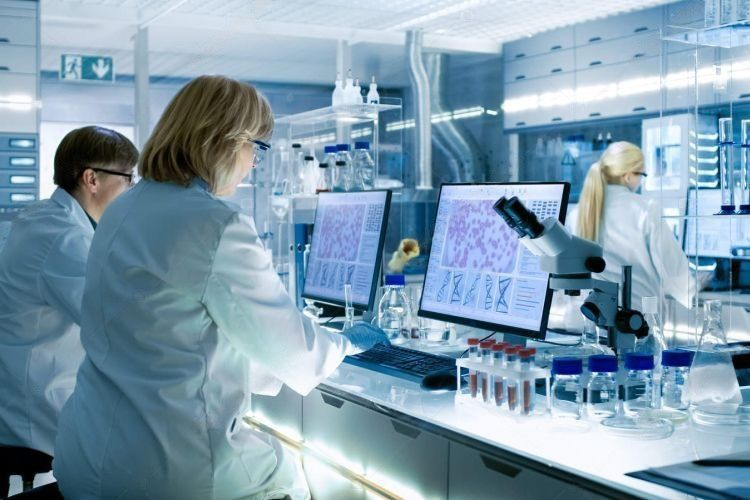
Alpha Laboratories has been providing medical laboratory services to the health care sector in Ontario since its inception in 1972.
Our team of dedicated staff, directors, pathologists and medical and scientific consultants provide expertise in all disciplines for which the laboratory is licensed and ensure the provision of the highest quality services to patients and the medical community.
Our medical division provides multi-disciplinary diagnostic laboratory services using state of the art technology under the expert supervision of Medical Directors, Pathologists and technical consultants. Alpha’s success is due to the commitment and dedication of all its’ staff.
We incorporate quality into our organization through active participation of management, laboratory personnel and medical directors/consultants from all sections in establishing and maintaining a quality culture. We take a leadership role in developing policies for each of the quality system essentials, ensuring that adequate resources and processes are in place for effective implementation. Effectiveness of our quality system is monitored through internal audits and annual review.

Excellence in Medical Diagnostic Services.
Alpha Healthcare Inc., our Canadian privately-owned parent company, was founded in 1971 with a focus on making the lives of healthcare professionals easier by providing them with a patient focused source for quality healthcare services. We started as a small Ontario-based laboratory, and, over several decades, we quickly grew into one of Canada’s leading healthcare services companies with more than 250 employees and a broad range of high quality, integrated patient centred service offerings.
Since its inception, Alpha Laboratories has delivered high quality health service to health care professionals and patients. Now more than 40th year, we have not wavered from our patient focused mission – from our origins in medical laboratories and pharmaceutical product testing; to our current evolution into a diverse group of companies that now encompasses Medical Clinics, Diagnostic Imaging testing and Integrated Information Software Solutions. We are committed to placing patient health first and delivering the highest standards in quality patient care.
What We Do
Anatomical Pathology
Anatomical Pathology is the oldest of the sciences in laboratory medicine which examines the structure and physiology of human tissue. Clinical Chemistry.
Tissues that have been surgically removed from patients are processed using a variety of embedding techniques enabling laboratory scientists to cut very fine sections from selected samples. These sections are then stained and examined microscopically by our pathologists to look for the presence of pre-malignant and malignant states. The information yielded by these examinations determines whether or not the patient requires further treatment.
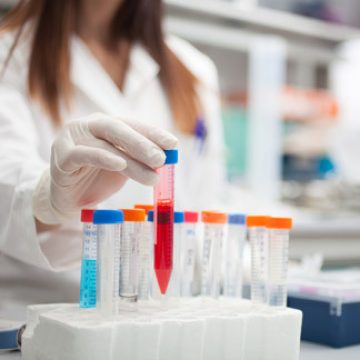
Clinical Chemistry
Clinical Chemistry performs measurements of the chemical components (analytes) in body fluids.
The most common specimens tested are blood and urine but they may also include cerebrospinal fluid (CSF), stool and other body fluids such as synovial fluid. Automated and manual testing are used to determine qualitatively and quantitatively the levels of these analytes in the body fluids.
These measurements are useful in aiding the doctor to diagnose the patient’s medical condition, to prescribe appropriate medication, and to monitor treatment for diseases such as diabetes.
Some of the more common analytes tested include blood glucose, electrolytes, enzymes, hormones, lipids and lipid profile proteins, therapeutic drugs and occult blood.
Immunoassay
An immunoassay is a biochemical test that measures the concentration of a substance in a biological liquid, typically serum or urine, using the reaction of an antibody or antibodies to its antigen. The assay takes advantage of the specific binding of an antibody to its antigen. Monoclonal antibodies are often used as they only usually bind to one site of a particular molecule, and therefore provide a more specific and accurate test, which is less easily confused by the presence of other molecules. The antibodies picked must have a high affinity for the antigen (if there is antigen available, a very high proportion of it must bind to the antibody).
Both the presence of antigen or antibodies can be measured. For instance, when seeking to detect the presence of an infection, the concentration of antibody specific to that particular pathogen is measured. For measuring hormones such as TSH, the TSH acts as the antigen.
For numerical results, the response of the fluid being measured must be compared to standards of a known concentration. This is usually done though the plotting of a standard curve with the aid of a computer which helps in the determination of the concentration of the unknown.
Detecting the quantity of antibody or antigen can be achieved by a variety of methods. One of the most common is to label either the antigen or antibody. The label may consist of an enzyme (see enzyme immunoassay (EIA)), radioisotopes such as I-125 Radioimmunoassay (RIA), magnetic labels (magnetic immunoassay – MIA) or fluorescence.
Immunology
This branch of laboratory medicine uses a combination of techniques to test for the presence of and immunity to viral diseases such as hepatitis A, B and C, rubella and infectious mononucleosis.
Investigations relating to auto immune diseases that include rheumatoid arthritis, lupus, progressive systemic sclerosis, primary biliary cirrhosis and others are also performed.
Testing for the presence of anti-streptolysin O, an antibody that is produced in response to infection caused by Beta-hemolytic streptococcal A infections, forms part of testing in this category.
These test procedures aid physicians in diagnosing disease and also in monitoring treatment.
Special Chemistry - Electrophoresis
Human body fluids contain various proteins & protein complexes which are vitally associated with different physiological functions. In serum protein electrophoresis, the charged protein molecules in the serum move through the electric field at different mobilities and become separated into different bands. Inspection and quantitation of these bands provide valuable diagnostic support for a number of diseases, such as multiple myeloma, acute and chronic inflammation, kidney diseases, liver diseases, and nutritional disorders.
Immunofixation electrophoresis employs the electrophoretic separation of proteins in conjunction with specific antibodies to help diagnose multiple myeloma and immunodeficiency states.

Cytology
Cytology studies individual cells obtained from anywhere in the body that can be sampled through scraping, aspiration, or normal expulsion.
The cellular samples are processed, stained, and then examined microscopically to determine the presence or absence of cancer and other diseases.
The laboratory processes mainly Pap smear samples using either conventional or liquid-based procedures.
Other samples including sputa, urines, breast, and synovial fluids are also examined.
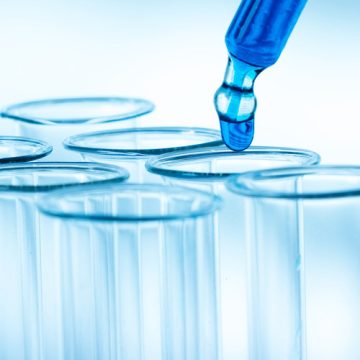
Hematology
Hematology is a branch of laboratory medicine that investigates blood and blood forming tissues in the search for diseases of the blood such as anemia, leukemia and hemoglobinopathies.
The use of sophisticated analyzers combined with microscopic and morphological examinations enables laboratory scientists to provide accurate diagnostic information to physicians.
The Hematology laboratory also investigates diseases such as thrombosis and conditions affecting haemostasis for which anticoagulant therapy is prescribed.
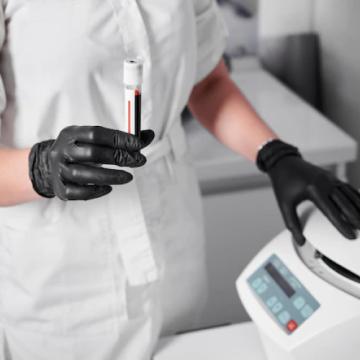
Immunohematology
Immunohematology (also referred to as blood transfusion science), includes the determination of the ABO and Rhesus blood groups mainly for pre-natal testing and to detect the presence of atypical blood group antibodies. Such procedures aid the physician in determining whether the patients require treatment to prevent hemolytic disease of the newborn pre and post-delivery.
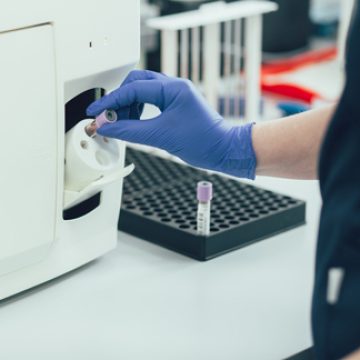
Microbiology
Microbiology is the science of the pathogenesis of microbial infections and the general approaches to the laboratory diagnosis of infectious diseases.
Bacteriology
Medical bacteriology is concerned with the detection of bacterial pathogens and their antibiotic profiles. Specimens such as sputa, urines, stools, eye swabs, ear swabs, throat swabs, wounds, tissues, and genital discharge swabs are submitted for microbiological analysis. Specimens are processed using appropriate microscopic and/or culture methods, or rapid detection methods for targeted pathogens. Disease-causing organisms are identified and promptly reported to physicians, with antibiotic susceptibility testing where appropriate, to guide the treatment of infections.
Molecular Diagnostics
Alpha Laboratories employs advanced molecular diagnostics to assist clinicians in the diagnosis and management of infectious diseases.
Among the pathogens currently targeted by these technologies at Alpha are Chlamydia trachomatis and Neisseria gonorrhoeae. Chlamydia refers to a genus of small obligate Gram-negative intracellular bacteria that cannot be cultivated on synthetic media. The genus includes several species and Chlamydia trachomatis infections are now recognized as the leading cause of sexually transmitted diseases (STD) worldwide. Chlamydia trachomatis is known to cause cervicitis, pelvic inflammatory disease (PID), infant conjunctivitis, infant pneumonia, urethritis, epididymitis and proctitis. Chlamydia trachomatis also causes approximately 50% of all reported non-gonococcal urethritis (NGU) in men. Among women, the consequences of Chlamydia infections are severe if left untreated. Since approximately half of these infections are asymptomatic, many cases go undetected and untreated, leading to additional problems particularly with pregnant women. Babies born to Chlamydia infected mothers are at high risk of developing inclusion conjunctivitis and pneumonia.
Neisseria gonorrhoeae is a non-motile Gram-negative, oxidase-positive diplococcus. In men, gonorrhea (gonococcal infection) usually results in acute anterior urethritis accompanied by a purulent exudate. In women, the infection is most often found in the cervix, but the vagina and uterus may also be infected. Frequently the infection is asymptomatic, especially in women. Without treatment, local complications of gonococcal infection can occur including PID or acute salpingitis for women and epididymitis for men. Rarely, disseminated gonococcal infection (DGI) may occur in untreated patients.
Alpha Laboratories uses real-time Polymerase Chain Reaction (PCR) nucleic acid amplification technique for the detection of Chlamydia trachomatis and Neisseria gonorrhoeae in urogenital specimens from both men and women. PCR is remarkably sensitive and specific for detection of both pathogens. This PCR-based assay, with a rapid turnaround time and improved sensitivity, has become one of the most valuable molecular diagnostic tools in assisting clinicians during the course of diagnosis and treatment of STDs.
Mycology
Medical mycology deals with the identification of medically important fungi as an aid for the diagnosis of human fungal diseases. Specimens from various sites, such as skin scrapings, nails, tissues, and other samples are submitted to the Mycology Section for analysis, using microscopic and culture methods.
Parasitology
Medical parasitology deals with the detection of medically important parasites and worms as an aid for the diagnosis of human parasitic and tropical diseases. There are numerous parasitic species, but only a few are directly involved with important human diseases. Most intestinal parasites are detected in preserved stool specimens.

Licensing & Accreditation
Alpha Laboratories is licensed by the Ontario Ministry of Health and Accredited by Accreditation Canada Diagnostics
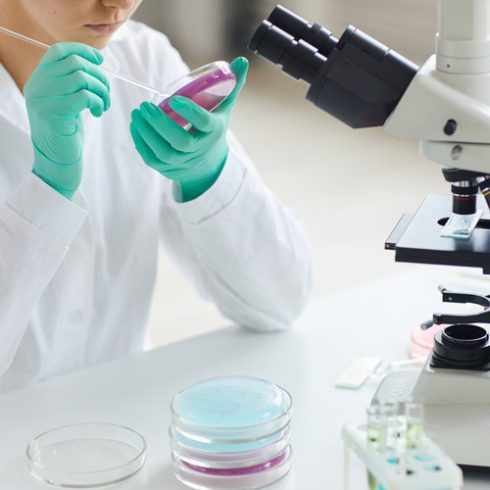
Research and Innovation
Advancing the state of medical knowledge and clinical practice has been part of Alpha Healthcare’s DNA since the company opened its first medical lab in 1971. Despite the accelerating pace of new developments in disease prevention, diagnosis and treatment – and the pressure on practitioners to do more with less due to the aging population and constrained funding – Alpha remains firmly committed to its mission of Advancing Healthcare for All.
